
A keyword can be called a focus word that explains the contents of your page in the best possible way. It is the search term which is present in content and matches the search intent. In terms of SEO, they’re the words and phrases that searchers type into search engines. If you go through everything on your page including all the text, images, video, graphics etc., then keywords are the simple words and phrases which can help you sum up the contents of your page. Keywords are well researched search terms that a website owner or SEO professional uses to optimize a website in the hopes of ranking at the top of search engines for specific topics.
For example, if you were looking for the latest news on Coronavirus then you might type “latest news on coronavirus” into the search engine. Even though it is a phrase and consists of more than one word, it’s still a keyword.
But of course, nobody outside of the SEO industry uses jargons like these. Most people would call them internet searches or queries. Just know that keywords are synonymous with both of these things.
To explain this better let’s say you’ve got a website about SAAS Marketing and you blog about everything SAAS related, from queries to tips to marketing strategies. Then the keywords for you can be SAAS marketing tips, SAAS marketing strategies etc.
You can say that, you need to know and understand how people are looking for your products, services or the information you are providing on your website to make your page accessible to your target audience otherwise they will land on one of the many other pages in the search results. This is why developing a list of keywords is one of the first and most important steps for search engine optimization. Keywords and SEO plays a big role when it comes to running and winning the search results game.
What is keyword research?
By now you know that keywords are highly effective for SEO and should be chosen very carefully but the question is how do you find a keyword which is not only related to your website but is also popular in searches! To know the answer to this you should first understand what keyword research is? Keyword research is the process of researching popular search terms people type into search engines like Google, and then include them strategically in your content so that your content ranks higher on a search engine results page (SERP). So to state in simple words keyword research is the process of choosing a topic for your content that is focused on a set of targeted queries that you want to rank for on a search engine.
The History of Keyword Research
Although SEOs professionals have used keyword research since 2005, the whole process of choosing a keyword for your content has changed a lot since then. Now search engines consider well-written content aligned with search intent when ranking content. Keyword density no longer remains the main criteria to rank higher in a search result. Keyword research strategies have changed and continue to adapt to ever-changing search engine algorithms.
Generally keyword research takes place in the early stages of content creation and at times lays down a foundation for future projects or content. You can even use keyword research to help you decide on the topics you should write about next on your blog as it will help you rank high in search engines.
By researching for words that people type into search engines and using this research to create targeted content, you can drive your targeted audience to your site — traffic that is more likely to convert into loyal visitors.
An example: You plan on starting a new blog (a blog about SAAS marketing) so you think of doing keyword research. But you don’t know where to start. So you try to understand what were your questions when you first started. You might think of things like:
- What is SAAS Marketing?
- Who is searching for this term?
- When are people searching for SAAS marketing, B2B SAAS branding, etc.?
- How are people searching for SAAS Marketing?
- What words do they use?
- What questions do they ask?
- Are more searches performed on mobile devices?
- Why are people seeking advice on SAAS Marketing?
- Are individuals looking for some tips on SAAS Marketing or do they need full fledged guides?
And finally how can you help provide the best content about SAAS marketing to cultivate a community and fulfill what all those people are searching for? Asking these questions is a crucial planning step that will guide your keyword research and help you craft better content which is not only useful but also satisfies the search intent.
Why is keyword research important?
In your mind, you must be thinking, “I know what my keywords are. Why do you need to do more keyword research?” The simple answer, the words matter, and in SEO they matter more than you may ever be able to comprehend.
One of the main differences between a website that gets a lot of organic traffic and one that gets nothing are the keywords you use. If you do not pay attention to the keywords you use, you may target either the wrong audience, or miss the search intent all together.
So let’s get this out of the way now. Keyword research is NOT just making a list of words that you think are important. Keyword research is done to identify a number of factors like relevancy, search volume and user intent, all while keeping in mind the audience you are targeting and the goal you have set for your business.
So, by using effective keyword research tools you can determine most searched terms by your target audience, find related topics you may have not thought of, and then create your content to rank well in search engine results.
Keyword research will put you in a strong position and help you achieve your goals you have for yourself and your business.
Now the question is how do you find keywords for your business?
How to find keywords?
There are simple steps you can follow to find the keywords that are most suited for your content.
- Find your “seed” keyword
- Find the keywords your competitors rank for
- Take help of keyword research tools
- Analyze your niche
1. Find your “seed” keyword:
Seed keywords lay the foundation to your keyword research. They will help you understand your niche. So if you use any keyword research tool it will first ask you your seed keyword and then provide you with a list of various keywords which are related to that seed keyword.
If you understand your niche, finding your seed keyword will be very easy.
But you should also understand that seed keywords themselves won’t necessarily be worth using in your content. As the name suggests, you’ll use them as ‘seeds’ for the huge plant of keywords you must focus on. For example the seed keyword for business related to Saas Marketing will be “Saas Marketing”. The generated keywords then may be “Tips for Saas marketing”, “Saas marketing strategies”, “Beginner guide for Saas marketing”, etc.
2. Find the keywords your competitors rank for:
Find out who your competitors are and then research on the keywords that have generated traffic for them. This is where your brainstormed list of keywords will play a role. Just search for one of your seed keywords and see who ranks on the SERP.
For example if you have a tool related to project management then look for the top 10 SERP results with your seed keyword.
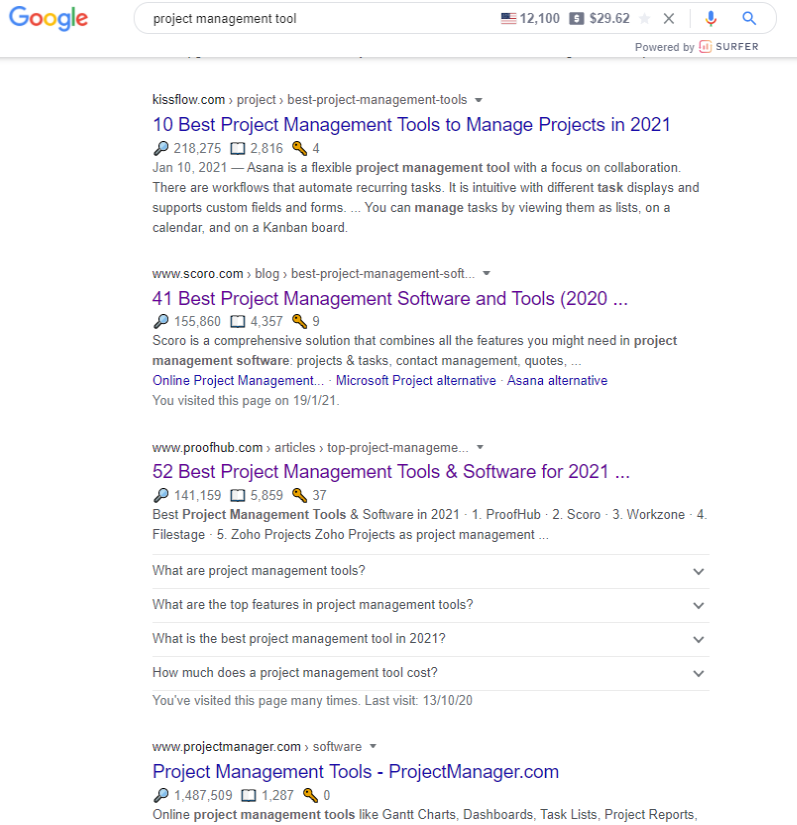
From there you can easily spot your competitors and work on the keywords which they are using for their website.
3. Take help of keyword research tools:
Although your competitors can be a great source of keyword ideas but there are still tons of keywords your competitors may be overlooking, and you can find these using keyword research tools.
All keyword research tools work the same way. You plug in a seed keyword, and they pull keyword ideas from their database based on that keyword.
To do this you can take help of online tools like ahrefs, semrush, moz, etc.
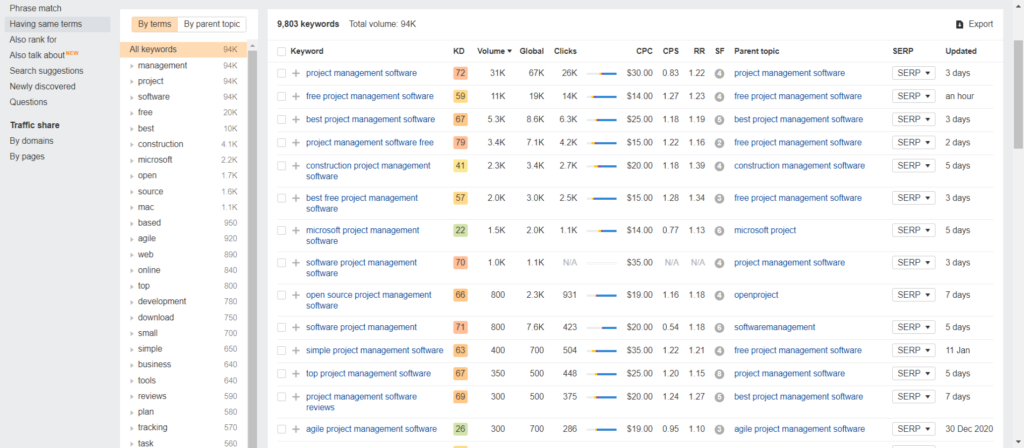
4. Analyze your niche:
By now you know how to find the best keywords for you and studying your niche will help you have a better chance at ranking higher in the search results. And a good way to start is to browse industry forums, groups, and Q&A sites. This will help you find the hidden gems for the search intent.
5. Research related search terms
This is a great way to find search terms for your niche when doing keyword research.
Take a look at the related search terms that appear when you plug in a keyword into Google to get more search term ideas that people might be searching related to your niche. When you type in your search query and scroll to the bottom of Google’s results, you’ll notice some suggestions for searches related to your original input. These keywords can spark ideas for other keywords you may want to take into consideration.
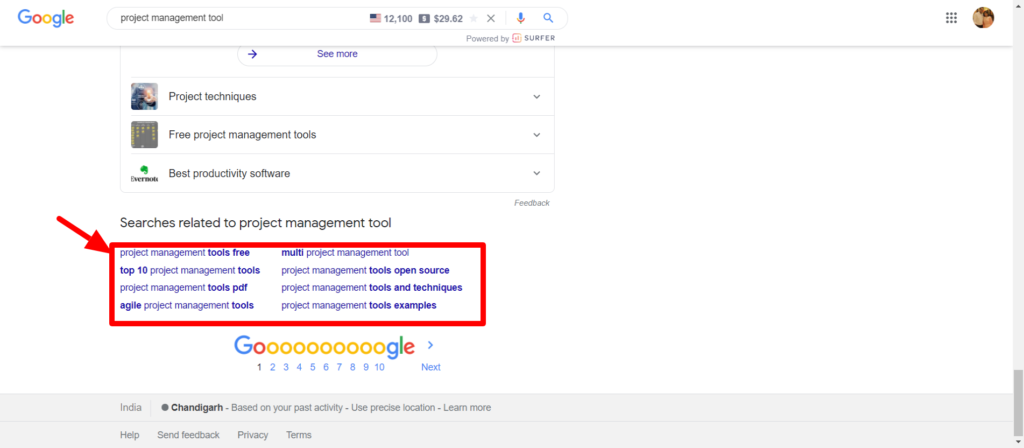
How to analyse keywords?
Thinking of packing your content with keywords may sound fascinating but how do you know which ones are the best? After all, using all of them will be a task
The answer is very simple: Use the SEO metrics to narrow things down and take the bad fish out of your own created pond.
Let’s explore five keyword metrics you can use to do this.
- Search volume
- Clicks
- Traffic potential
- Keyword Difficulty
- Cost Per Click (CPC)
1. Search volumes:
It is the annual/monthly average of the times a keyword gets searched. This tool will help you identify super high volume keywords and will also help you filter important lower volume keywords. Now you can design a combination of both to rank higher on the results page.
2. Clicks:
This will tell you the monthly average of clicks a keyword gets. This will help you to filter out the keywords with terrible click rates.
3. Traffic potential:
Ranking for more than one keyword is quite the norm. Don’t judge the keywords on clicks alone. Analyze the top ranking sites and try to estimate the total search traffic potential of the content.
4. Keyword difficulty:
There are keyword difficulty assessment tools available but you should try to manually filter and rank the difficulty of a keyword. You can consider parameters such as number of backlinks, the quality of backlinks, content length, domain rating, search intent etc.
5. Cost per click:
Although this is more fruitful for the advertisers still this can help you generate traffic. While search volume for most keywords stays roughly the same from month to month, its CPC can change any minute. So the keyword that has higher cpc also has higher buyer intent. Therefore it should be used in your keyword list.
How to target keywords?
For every keyword on your list, you need to create the right kind of content to address it. Understanding how to do this is a crucial step in the keyword research process. Luckily, you can do it in two simple steps.
- Identification of parent topic
- Identification of search intent
1. Identify the Parent Topic
Let’s say that you’ve got these keywords on your list:
- Saas Marketing
- How to do saas marketing
- What is saas marketing
- Saas marketing strategy
- Tips for saas marketing
Now you must wonder if you should create something different for every keyword or should you fill in all the keywords in one single page ?
The answer depends on how google is reading these keywords. Does it see them as part of the same topic (i.e., Saas marketing) Or does it see them all as individual topics? You can get a sense of this by looking at search engine results.
For example, you can see in screenshot some of the same pages ranking for “What is saas marketing” and “saas marketing strategy.”
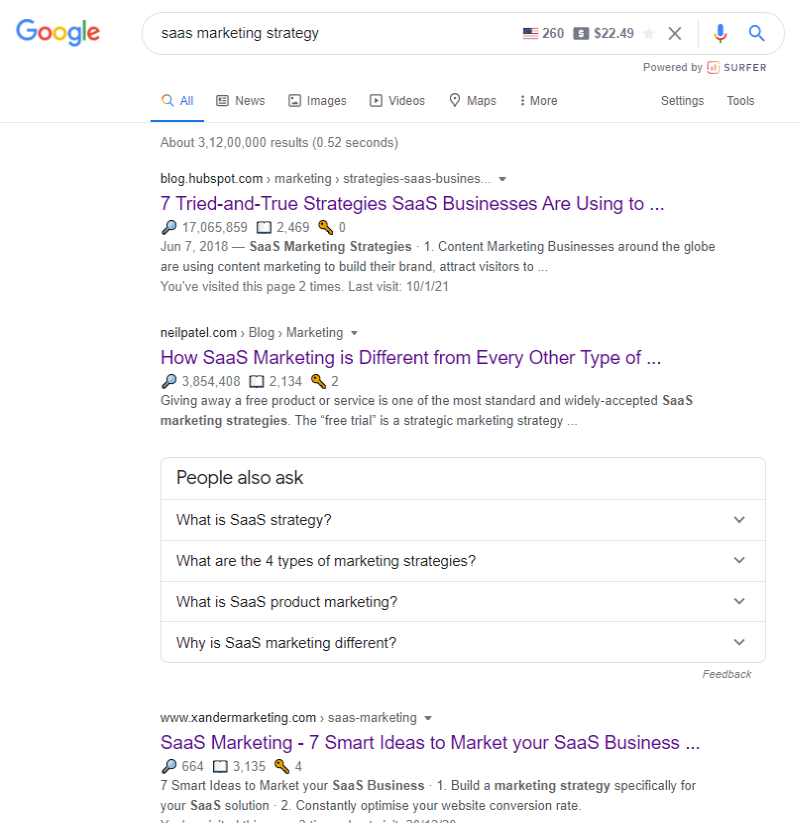

This indicates that Google views both of these keywords as part of the same topic.
2. Identify search intent
Let’s say that you have these keywords on your list:
Keyword research for SAAS
B2B SAAS keyword research
Keyword Research for SAAS marketing
SAAS marketing strategies
If you run a blog, you need to understand the target of your blog post.
You should know what people are searching for and what are their specific queries
Google understands intent better than anyone, so the top results for a keyword are often a good substitute for search intent. If you want to stand the best chance of ranking, you should create content that justify your search intent as you already see on the first ten ranking pages.
You can also target your audience by targeting the three C’s of search intent
- Content type
- Content format
- Content angle
1. Content type
Content types can be of various types such as : blog posts, product, category, landing pages, or videos etc.
2. Content format
Content format is the information about the keyword which can be in the form of blog post, how-tos, listicles, landing pages, etc
3. Content angle
Content angle is the selling point of the content. For example, people searching for “keywords” want to know what are the keywords and how they can be used to rank higher on a search result.
While search intent is important and can help you rank higher on the search results, one should also consider being confident in their content. If you think you are bringing something new to the table and believe in the content, then you must consider the fact that CONTENT IS THE KING.
For example: For keyword “ Agile project management software” content type is blog post, content format is listicle & content angle is to provide you the information of agile tools for project management.
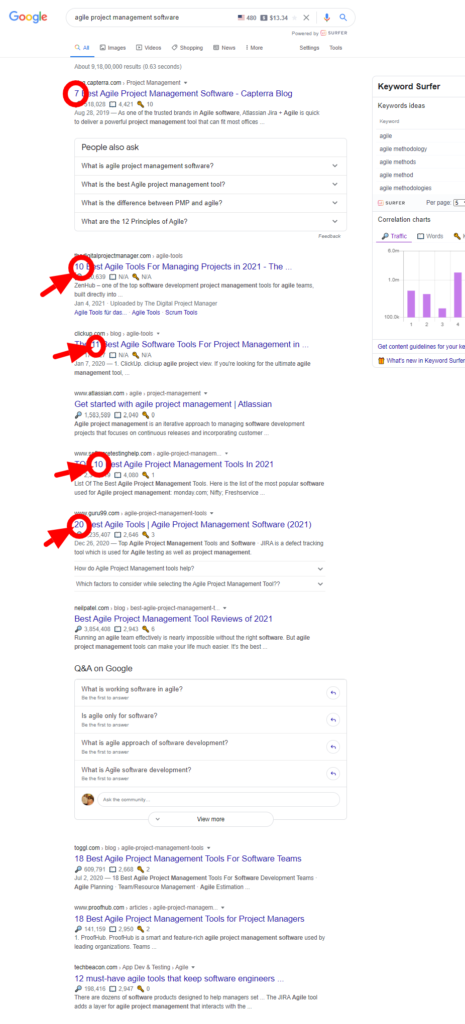
Types of keywords:
With all said it’s important to know which type of keyword you should be using to get your content the desired ranking on any search engine.
Keywords are broadly categorised into four types:
- Keywords by length
- Targeting keywords
- Buyer keywords
- Onsite keywords
1. Keywords by length:
The length of the keyword also plays an important role in defining the search volume. The types of these keywords are:
Short tail keywords:
Usually of one or two words and are very competitive. Can also be termed as generic or headboard keywords.
Example: SAAS Marketing
Mid tail keywords:
These are the type of keywords which consist of two to three words. These are a combination of high ranking short tail and conversion driven long tail keywords.
Example: what is SAAS marketing
Long tail keywords:
These are the search phrases and are very specific. But have low search volume because of the same reason.
Example: Best SAAS marketing blogs for beginners
2. Targeting Keywords:
These are the jargons of your industry or the field you are working in.
Market segment keywords:
Terms that a target audience uses for general information.
Example: SAAS marketing
Customer defining keywords:
The keywords that define the audience or the customer.
Example: SAAS strategies for beginners
Product keywords:
Keywords specific to the product.
Example: Beginners guide to SAAS
Branded keywords:
These include specific brand names along with other keywords in a search phrase.
Example: ProofHub project management tool, Asana project management
Competitor keywords:
Keywords that focus on the competing businesses, products and services.
Example: Alternatives to basecamp (competitors of ProofHub)
Geo-Targeted keywords:
The keywords that focus on specific geographical location.
Example: Professional SEO Services in Chandigarh
3. Buyer keywords:
Informational keywords:
Search phrases regarding a particular topic, product or service.
Example: What is project management
Transactional keywords:
The phrases that your target audience is expected to search right before they decide on whether they want to buy your product or not.
Example: best project management tools
Navigational keywords:
The keywords that the searchers use to get a clear idea about specific product, service or a brand.
Example: ProofHub
4. Onsite keywords:
Primary keywords:
These are the keywords that you use before using any other type of keyword. These are the keywords which will help you get a ranking and actually define the whole keywords optimization for you.
Example: SAAS marketing
LSI keywords:
These are the synonyms or variations of your primary keywords.
Example: best practices to SAAS marketing
How to prioritize keywords:
Keyword prioritization is not the ultimate move in the keyword research process; instead it is something you should do as you go along following the steps mentioned above. While looking for keywords, analyzing their metrics, and grouping them, you should ask yourself the following questions:
- What could be the estimated traffic potential of this keyword?
- How tough is the competition?
- What would it take to rank for it?
- Do you have the required content?
- If not, what will it take to create and promote your page?
- What is your ranking for this keyword?
- Could you boost traffic by improving your rank for the keyword?
- Will the traffic convert into leads and sales?
- Will it bring brand awareness?
While search volume, traffic potential, difficulty, and search intent are all very important arenas, you also need to consider what traffic from that keyword will be worth for your business and future.
The simple technique you can follow after this is:
- Think like your target audience: this will help you define the search intent. This will help you understand what problems the audience may be facing and finalise your keywords.
- Study your competition: Study what your competitors are doing to rank higher. Study the kind of content they are providing as it will help you understand the kind of content that is being demanded.
- Use a keyword research and analysis tool: although you can study and prioritize the keywords you want to use, these tools will help you have an edge with choosing the keywords.
- Analyze and understand the trends: what is in the words you may ask? Well in this case I may say “everything”. You often start to hear a particular word more often and that’s how you realise the word is trending. To understand what the audience is gravitating towards you should analyze the trends being followed and then finally decide on your keywords.
Tools you can use for your keyword research:
Some of the tools that you can use for your keyword research are:
- Ahrefs Keywords Explorer
- Moz Keyword Explorer
- Semrush
- Google keyword planner
- Keyword everywhere
- Google Search Console
- KeywordTool.io
- Google Trends
- KWFinder
- Answer the Public
Bonus tips
But wait, that’s not all for keyword research. Here are some Keyword research hacks for Saas companies that you can use to generate more traffic to your website.
- Go through the “People also ask for” quention list
You may have seen that whenever you reach out to google, it always shows up with some alternative questions when people often ask regarding your topic. Studying these for your keyword can be a great option for you.
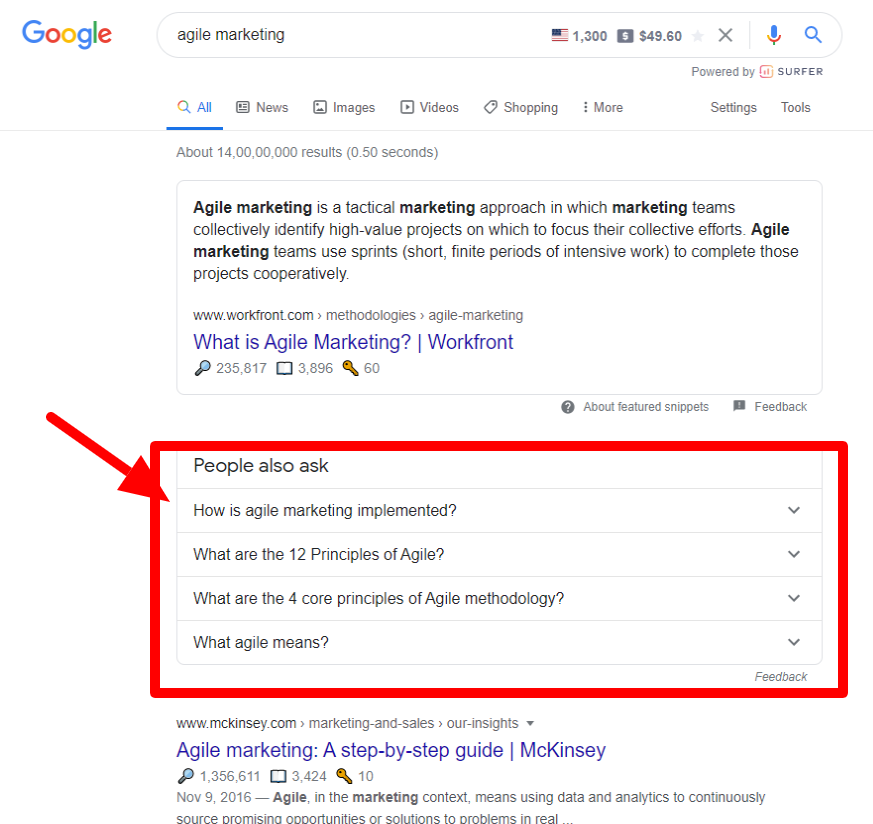
- Find other keywords for the rank one post
If you find yourself being stuck on a particular keyword then you can simply research what other keywords that the top result is ranking for. You can research these keywords by using keyword search tool Ahrefs.
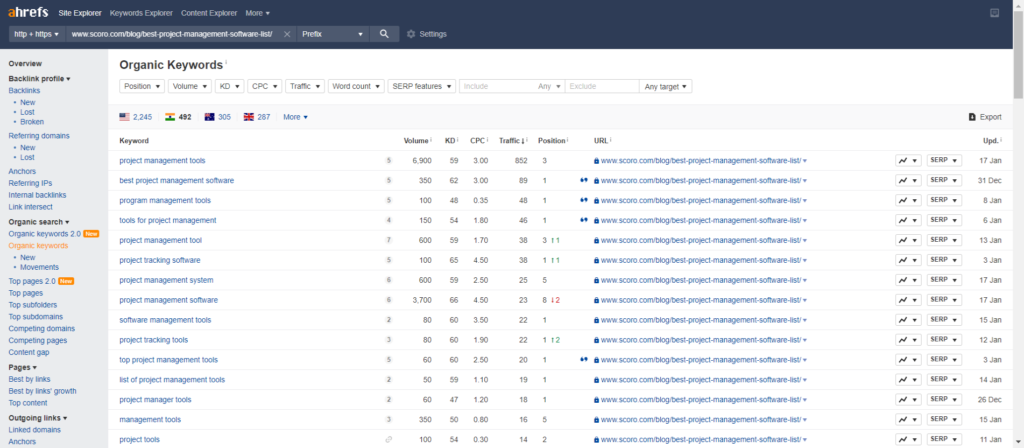
- Try adding a suffix
Adding a suffix may not seem like a magic wand trick but it is exactly that. Adding a suffix to your topic such as “cool”, “latest”, “best”, “Free” or “brilliant” may help you reap the benefits of unexplored keywords.
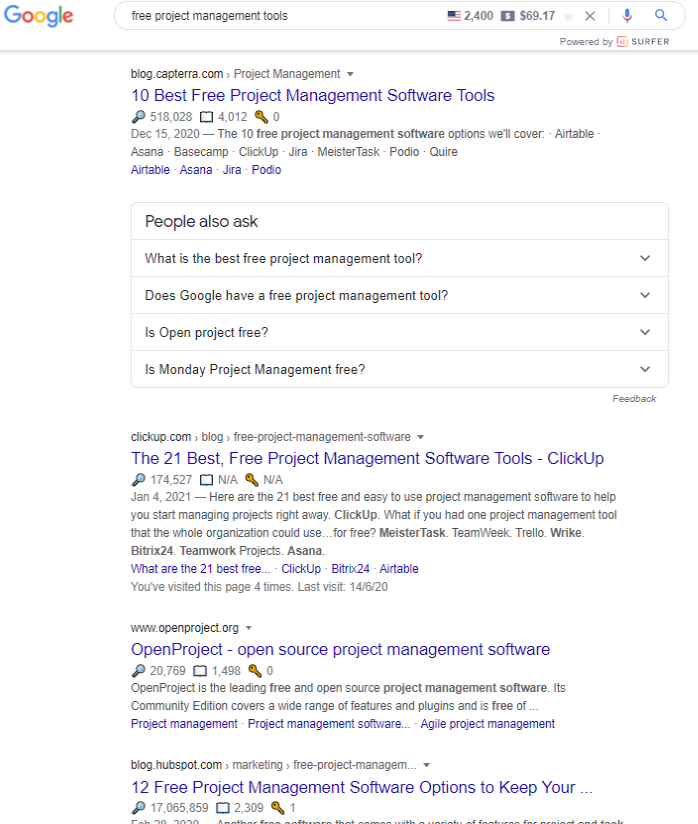
- Searching for brand alternatives
Searching for brand alternatives can be a great way to bring in more traffic. You can do a thorough research of your competitor brands and also the most popular brands. Now providing a just and accurate comparison to your audience which is also easy to understand can not only help you generate traffic but also help you gain the trust of your audience.
For example: Top 17 Trello Alternatives: List of Project Management & Kanban Software at ProofHub (Currently #1 for Trello alternatives)
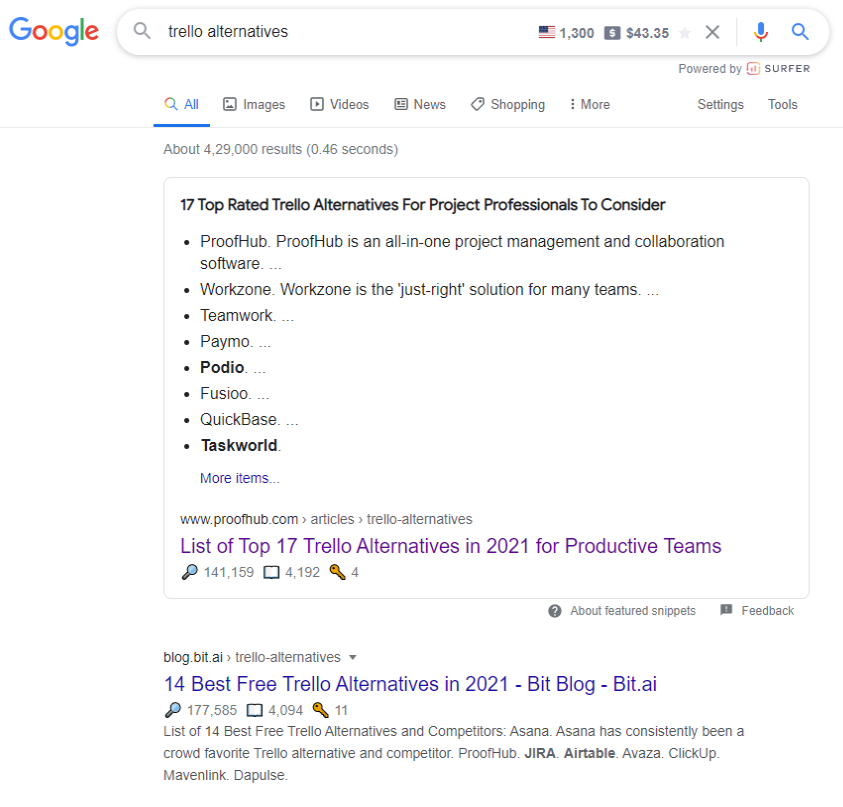
- Creating comparison pages
Creating comparison pages can be another great way to create brand awareness. You can create comparison pages on many grounds. These can be features comparison or taking it further to pricing comparison. Help your audience understand the comparison with the help of charts and tables and in no time this will help you bring organic traffic.
For example: Trello vs Jira vs ProofHub – Which Tool Is Best Of Them All? (Currently ranked on 1st page for Trello vs Jira)
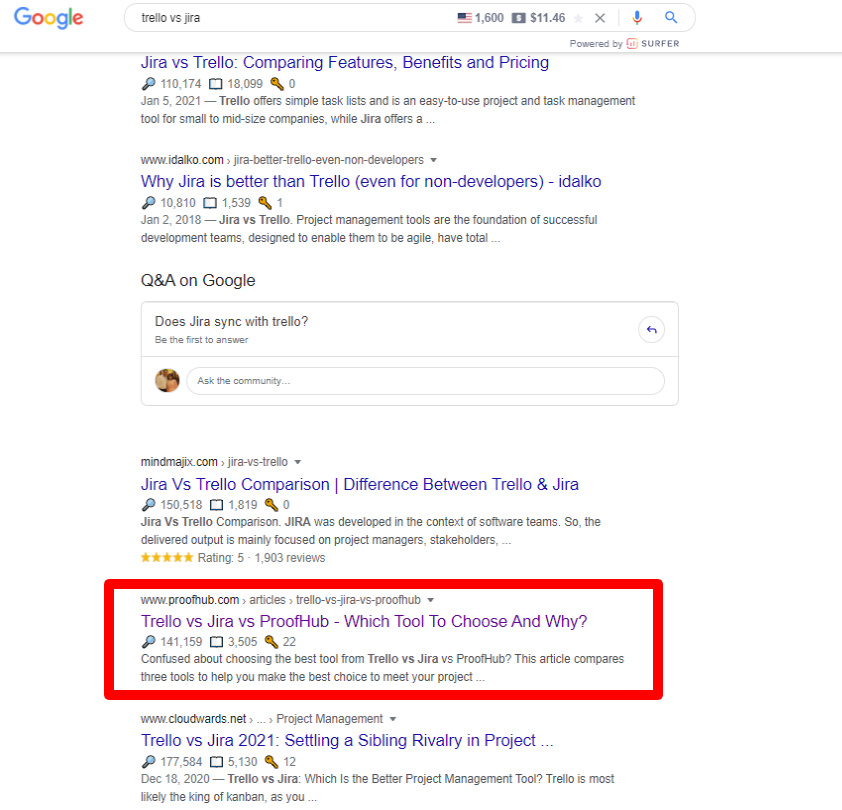
If you follow the steps mentioned above you will be one step closer to getting a higher rank on a search engine. SEO for SAAS is not just keywords research but much more which you will read about in our future blogs. Stay tuned for more.
Follow me on my social medium handles (Twitter: @sharmanandini4 | Instagram: nandinisehdev4 | LinkedIn: Nandini Sharma )and let me know if I missed out any tricks or hacks related to keyword research.